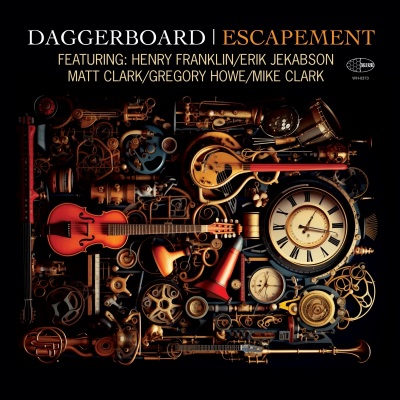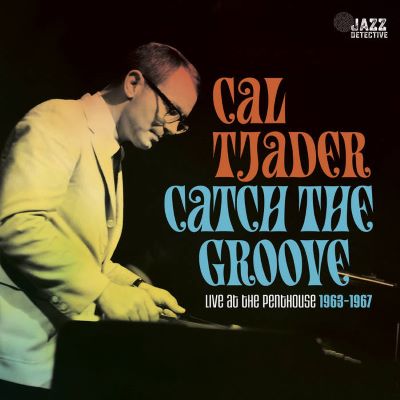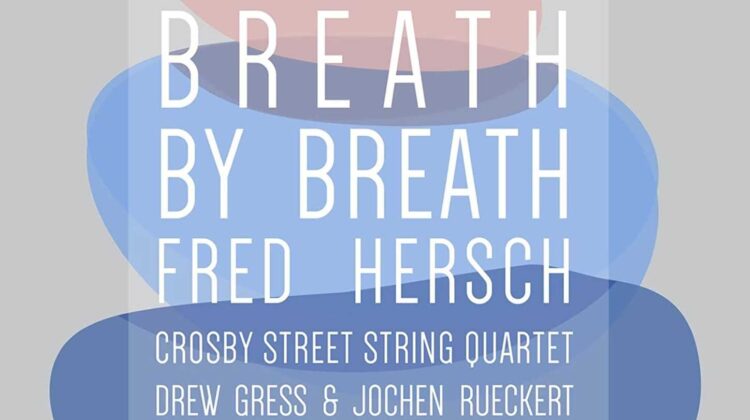So there I was to see the magical and comical and apparently never-aging Penn & Teller in the Penn & Teller Theater in the Rio All-Suites Hotel & Casino. After taking my seat, there appeared on the stage—no kidding—a piano-bass jazz duo! In Las Vegas yet! In a theater! In a city where brand-name entertainers like Beyoncé and Bruno Mars command top dollar at high-high-overhead casinos. After the lights dimmed, the feeling in the room was, incredibly enough, one of shared-interest enjoyment, as if the enthusiastic crowd were in a close-quarters jazz club like Just Jazz or Caylix—one that combines invitations to attentive listening with ebullient entertainment. But who would have expected an extraordinary discovery of top-shelf musicianship at no additional charge! just before Penn & Teller came out to mesmerize and amaze?
Well, the show before the show mesmerizes and amazes too. Apparent musical prestidigitation ensues, but there’s no sleight of hands. It becomes apparent that what the audience hears is what an immensely talented actual musician—a technical, harmonic and melodic wizard—actually performing wondrous feats on an actual piano. This piano player provides much unanticipated delight with lightning speed and mischievousness, tossing song fragment quotes hither and yon, performing magical feats that few others can accomplish on that instrument.
His name is Mike Jones. Have you met Mike Jones? You should. His flying fingers are something to hear. And surprise: Mr. Jones has been performing in the Penn & Teller Theater for sixteen years. Who knew? His financial security of 250 nights a year in front of packed theaters has afforded him a steady income and a lifestyle, including a home in Las Vegas, that many jazz musicians would enjoy. The flip side of that is that Jones’s talent would command much greater recognition if he were performing in New York nightclubs. That lack of widespread recognition doesn’t appear to bother him. Neither does the fact that even though Penn & Teller’s promotional images appear on the side of the hotel and in lights at the entrance, Mike Jones’s photo—one of intense concentration, confident ease, glasses, a closely cut receding hairline and stretched-ear plugs— does not, as far as I know, embellish the hotel’s exterior.
And who, pray tell, is that shy bassist standing outside the spotlight, as Jones receives all the attention. Could it be? Is it Lester Holt? Is it Randy Jackson? Is it a celebrity bassist in disguise? No. Well, I’ll be. It’s Penn Jillette himself, almost unrecognizable behind the piano in his pork pie hat. A little digging into Penn’s rationale for his appearance as a bass player before the show reveals that even a celebrity possesses unrealized ambitions. For it seems that Penn, an avid bass guitarist, yearned for the challenge of learning to play the upright bass despite its intimidating features. And what before Penn’s wondrous eyes should appear at the Paris Hotel but the solution to achieving his ambition: a technically brilliant jazz pianist in the awe-inspiring tradition of Art Tatum or Oscar Peterson or Errol Garner. Mike Jones’s versatility and force as needed were perfect for Penn’s on-stage trial by fire as he backed up the already-accomplished Berklee College of Music graduate. And so it happened that in 2002 Mike Jones became the Penn & Teller Musical Director. Not only that. Jones also assumed the responsibility of leaving audiences smiling with anticipation in the old-school tradition of live Las Vegas sit-down music.
The Show Before the Show provides a sample of the musical excitement of Mike Jones before the magical excitement of Penn & Teller. Jones admits that he does “overplay” on every track. Of course, that “overplaying” has challenged Penn to improve every night, and it allowed Jones to compensate as Penn learned. “Overplaying,” or in other words, “reaching out to the audience,” also invigorates the ticketholders, who anticipate to be rewarded with fun and amazement for their purchase. And they are.
Jones/Jillette start The Show Before the Show with a spirited version of “Broadway,” the song’s initial straightforward melody, block chorded and swinging, giving no hint of the improvisational variations, seamless and articulated with flawless precision, that follow. Also, the strength of Penn’s walking bass lines is evident, proving that he had become an accomplished musician on the upright bass by the time the album was recorded. Indeed, Penn takes a bass solo and then trades fours with Jones, making “Broadway” an apt introduction for the duo.
Jones appears to appreciate Brazilian songs as well, for he continues the track sequence with Jobim’s “Corcovado,” which showcases his apparent indebtedness to Peterson. The moderately fast pace allows for Jones to glide into lightning-fast two-handed unison lines, incredibly precise in their execution and played as if they were the result of an instantaneous thought. As the tension builds, Jones moves into right-hand tremolos supporting the melody in the left hand. One gets a sense of the duo’s absolute sense of time as Jones’s sixty-fourth-note runs end every time on the beat and on the root of the final chord. It wouldn’t be surprising if Jones limbers up his fingers before a performance in the manner of a warm-up by an athlete. The album includes Bonfa’s “Manha de Carnaval, this time starting with the right-hand tremolo before the melody commences as Jones slightly staggers the rhythm for emotional effect. Eventually, he devises entire choruses of similar two-handed unison improvisational lines, so difficult that few piano players could accomplish them so effortlessly. And then Jones ends with dramatic sweeps and a punctuating stinger to complete the narrative told by his version of the song.
Most of the other songs on the album are standards, re-interpreted with the duo’s skill as Jones leads with his musical prowess and extensive knowledge of jazz styles, famous recordings and ideas. Allusions abound; they go by so fast that they may be missed. The bounding “On the Sunny Side of the Street”—“bounding” due to Penn’s confident on-the-beat pulsations—breezes by a reference to “Every Little Breeze Whispers Louise” without undue emphasis, but rather as a thought that occurs during the performance. Jones throws in a quote of “Alexander’s Ragtime Band” to add some whimsy to “There Is No Greater Love.” He also finishes a chorus of “Have You Met Miss Jones” with the Bing Crosby/Andrews Sisters ending to “Santa Claus Is Coming to Town.” “But Not for Me” becomes a mixture of styles, combining an easy swing with references to Garner as Jones chugs out insistent repeated bass chords under the broadly chorded right-hand statement of melody. And then Jones switches to a stride chorus reminiscent of James P. Johnson.
Making Penn hold onto his hat, Jones speeds up the tempo, never missing a beat or a note, for his own composition dedicated to Penn & Teller, “Box Viewing Blues,” played with his characteristic stylistic panache and extroversion. And then Jones takes off on his own for the final track, “Exactly Like You.” A speed demon, Jones teases the audience with ever-faster tempos through successive choruses as he plays his own walking bass lines with his left hand. Just as the audience thinks that Jones can go no faster, he does. Already performing at a tempo speedier than that at which the song is usually recorded—for it’s usually sung or performed in an instrumentally accessible way for toe-tapping—Jones doubles the speed to wow the live audience with technique they wouldn’t hear in a recording, although indeed the synaptic quickness of performance is ironically on a recording. Incredibly, the articulation of notes remains just as exact, able to be detected without shortcuts or slurs, as before. That’s quite a thrilling end to the show before the show. No doubt Jones’s Kawai piano has to be tuned often after workouts like that of “Exactly Like You.”
After the Mike Jones/Penn Jillette show ended, the Penn Jillette/Raymond Teller show began for further enchantment of the audience. Penn & Teller explained a magic trick or two, and their others remained mysteries. And then after all of Penn & Teller’s beguiling legerdemain, the magic was over.
For both shows.
Artist: https://jonesjazz.com
Label: http://caprirecords.com










